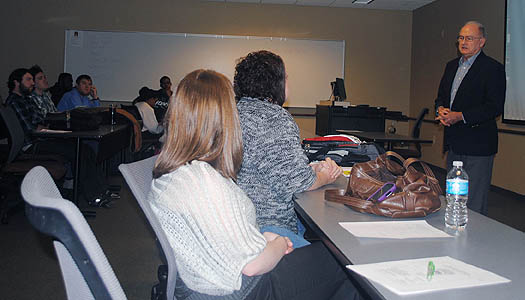A group of Tusculum College students spent the first part of the spring semester discovering what it is like to be in public office and researching issues that face local communities.
Students in Robin Fife’s “Theory and Practice of Citizenship” presented their research findings in a presentation on Thursday, Feb. 8, to their fellow class members and to local Tusculum and Greene County officials.
Fife, associate professor of social science, had her students form a mock government, based on the City of Tusculum, with students role playing as mayor, commissioners and other city positions, allowing them to learn they type of responsibilities and issues that each position faces.
In addition, students researched a variety of topics facing local governments, including gun control, environmental and educational issues.

Greene County Commissioner Robert Bird, who is an alumnus of Tusculum College and former mayor of the City of Tusculum, addresses students in a “Theory and Practice of Citizenship” course about his experience in public service.
One issue that has arisen in the City of Tusculum over the years is the availability of sewer service to residents. Students Cory Callahan of Bristol and Katie O’Neil compared sewer systems to septic tank systems and argued, based on their findings, that sewer systems are more advantageous to property owners and local governments.
In their research, the students said they found that septic tanks will be more expensive, over time, to upkeep for property owners, and malfunctioning septic tank systems can introduce disease-causing bacteria into the environment and contaminate groundwater sources.
Callahan said they discovered a sewer system designed for small communities as Tusculum that could be an alternative to hooking onto a neighboring municipality’s system. The system has less environmental impact and be less expensive for property owners over time, he added.
Ryan Norton of Greeneville reported his research into wetlands and their importance. Wetland areas are being established on the college campus through a partnership with the Middle Nolichuckey Watershed Alliance. Norton explained that the wetlands provide a way for water to be naturally cleansed of contaminants from storm water runoff and farm animals. It also provides places for birds to feed during migration.
With the recent school bus accident in Washington County, Kayleigh Johnson researched the installation of seat belts in school buses. School bus accidents resulted in 1,900 injuries to children during a recent year, according to statistics she found. Adding seat belts, which would cost about $10,000 to add to a bus, is a small cost in comparison to the potential prevention of injuries and deaths, she said.
Gun control was the topic of another presentation. Cheryl Lee said she would not recommend further gun control measures because her research found that gun control laws do not result in less violence. She noted that after gun control laws were enacted in Chicago in the 1980s, deaths from gun violence increased in the city, and the after the United Kingdom banned gun possession, its national crime statistics showed a rise in incidents.
Dawn Winchester discussed testing in K-12 schools. Based on her research, Winchester said she would recommend not placing such high stakes on achievement tests, because they do not improve student achievement and do not encourage students to be creative and think outside the box. The tests place much stress on both students and teachers, she added, and encourage the teachers to “teach the test.”
Other presentations were made about the advantages for students to live off campus and the legalization of hemp.


